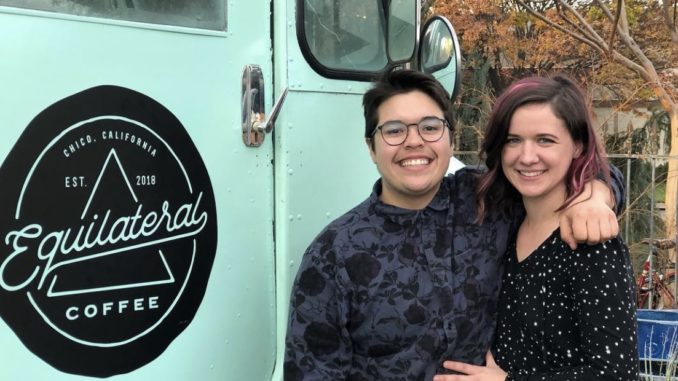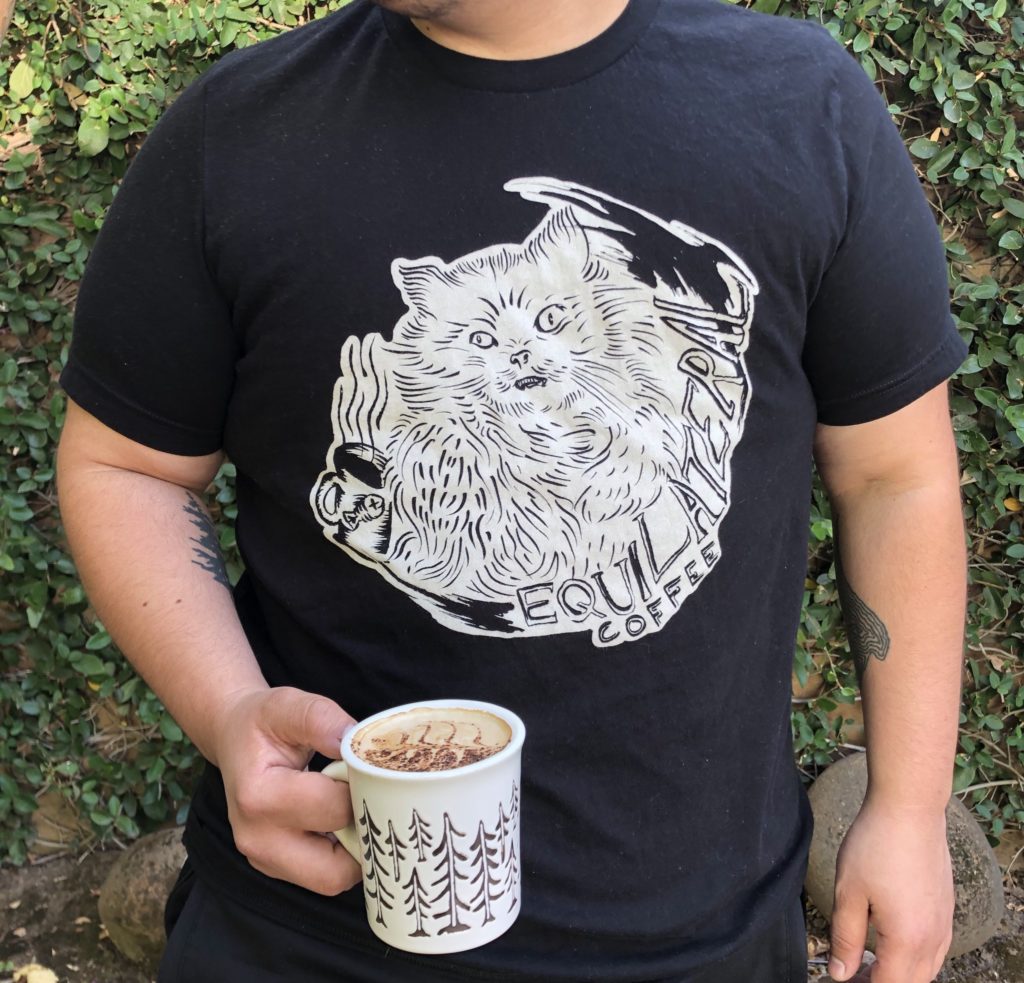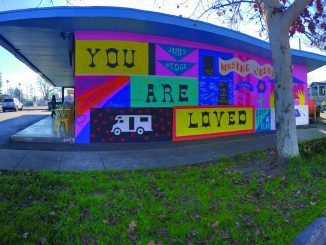
In 2018, Eileen Humiston and Rylan Morabito decided to take a risk and pulled the trigger on buying an old coffee truck they found on a Redding Craigslist ad. The truck was a fixer-upper built in 1969 and hadn’t been very well maintained, but the Chico couple loved its quirky vibe. For the most part, both Humiston and Morabito have been career baristas, so it was a big deal when the two self-professed planners spontaneously quit their jobs to put all they had into what became Equilateral Coffee. When the coronavirus pandemic hit, they were afraid they’d be out of commission, but an open invitation to post up the mobile cafe in the 1078 Gallery’s parking lot on Park Avenue has allowed them to keep on truckin’.
Why start a coffee business?
Morabito: We just thought, “Why not?” We were both unhappy with our jobs. We both love coffee, but it’s hard to make a career out of being a barista. You just don’t make enough money. Both of us have worked at a bunch of great local businesses in Chico, so we had some similar experiences, but we both landed in coffee and wanted to stay in it.
Where’d the name Equilateral come from?
Humiston: Well first, I really love triangles and I wanted one in the logo.
Morabito: We were having a lot of trouble with the name just because it seemed like such a big thing, like, once we choose the name that’s the name. And we kept thinking of things that sounded really silly. We both dislike cliche coffee names—anything that has coffee in it. We just didn’t want it to be like that. And then we also didn’t want to be so far from coffee that people are like, “Why would you do that?” … Another big part of it is [that] equality is huge to us. We like that the name has “equal” in it because we’re both queer and being queer in business can kind of get drowned out sometimes. We want people in our community to have a safe place to go—somewhere they feel respected and valued.
How did you choose Wrecking Ball Coffee Roasters?
Humiston: Before we started—but after we bought the truck—we knew we didn’t want any beans from Chico because so many places tend to use the same ones.
Morabito: There’s nothing wrong with them, we just wanted to do something different. We’re more medium-roast people and a lot of people around town lean toward dark roast.
Humiston: We wanted something special. I was researching roasters in the Bay Area because it’s still kind of nearby, and then Wrecking Ball got my attention because their [signature] roast is called “Pillow Fight,” which I thought was really fun. And then while I was looking at that [online], their Twitter feed was linked to it, and the first thing I saw was something about Trans rights and it made me think, “Wow, so they’re a good company, too.” So we got in touch with them and their beans were delicious. It felt like it was meant to be.

Anything special you offer that people might not realize?
Morabito: I don’t know. We always try to tell people we make our own syrups.
Humiston: That’s true. Most people don’t know that. Sometimes telling people that will change their mind, like, “Okay yeah, I want to try it.” We have some staples, and then the other ones I just think about seasonally. I love pumpkin spice so obviously we do that in the fall. I just play around with them. They often don’t turn out the first try so I have to make a few batches to get it to taste how we want it to. It’s a lot of experimenting.
Morabito: The hazelnut is based off of a coffee Eileen ordered in Portland.
Humiston: It was the best thing I’ve ever had, so I knew I had to recreate that one.
Morabito: It’s the one she’s most proud of. Or so she says.
Humiston: Rylan actually does not like hazelnut syrup, but really likes mine. Usually, hazelnut syrups don’t even taste like hazelnut—I don’t know what they taste like. But this is real hazelnut, so it might taste different than what people are used to.
Stalking you on social media, I see you’ve posted in support of Blackout Day, Stonewall fundraisers, and other recent social activism. As a small business in Chico, do you fear consequences for showing support for progressive causes?
Morabito: I think there’s a little bit of fear there. We have an eight-year-old and he’s on the truck with us with school being closed and all that. It can be scary to be out in the public and just be open to anybody walking up and saying what they want. I think it’s also just felt like a non-negotiable thing for us. We can’t be providing a safe environment for people but then not speaking up on their behalf. We also have some really good examples in the community. Blackbird is really good about speaking out about stuff and making sure that they are doing things to support people and to support the community by standing up for everyone.
Ultimately, it isn’t that hard to speak out. You have to do it. It helps that we park outside the 1078 Gallery because they make statements of their own that line up with ours and I think if people are going to get mad about that type of stuff they’re likely not going to come to us anyway.
Working at other places, we weren’t always allowed to express that and it felt bad. You just can’t say anything, or you say a little bit too much and then your boss sits you down and tells you you have to keep the peace because they don’t want to take a political stance. It’s just awkward because supporting human lives isn’t exactly a political stance.


Be the first to comment